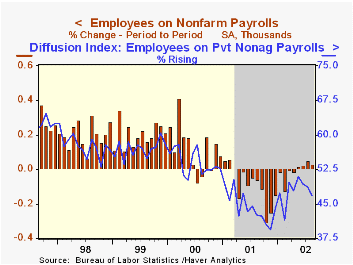 Global| Sep 06 2002
Global| Sep 06 2002August Payrolls Rose Modestly
by:Tom Moeller
|in:Economy in Brief
Summary
Payrolls rose about as expected last month, up 39,000. July's gain in payrolls was revised up to 67,000 from just 6,000 reported last month, but June's gain was lowered to 34,000 from 66,000. Payrolls are about unchanged YTD. The [...]

Payrolls rose about as expected last month, up 39,000. July's gain in payrolls was revised up to 67,000 from just 6,000 reported last month, but June's gain was lowered to 34,000 from 66,000. Payrolls are about unchanged YTD.
The length of the workweek recovered slightly following a steep July plunge. As a result, the index of aggregate hours worked (employment times hours worked) rose 0.3%, but the average for 3Q so far is 0.4% below the 2Q average.
Amongst industries, factory sector jobs fell by 0.4%, the largest one month decline since February. The one-month diffusion index of 39.7 was the weakest breadth-of-gain in factory payrolls since February. Construction jobs rose 34,000, more than reversing the July slide. Jobs in service producing industries rose 72,000 but that was dominated by a 41,000 rise in government employment. Private service producing jobs are up 0.3% YTD.
The one-month diffusion index for nonfarm payrolls remained below the 50% level, at 46.7, down for the third consecutive month. The level suggests little or no employment growth near term. The three month diffusion index was 47.1.
Average hourly earnings rose as expected and the July gain was revised down slightly.
The unemployment rate fell as a result of a huge 429,000 (0.3% YTD) rise in employment but only a 226,000 (0.2% YTD) rise in the labor force.
The employment figures for nonfarm payrolls are based on reports provided to the US Labor Department by businesses, while the figures from which the unemployment rate is derived are based on a survey of US households.
| Employment | Aug | July | Y/Y | 2001 | 2000 | 1999 |
|---|---|---|---|---|---|---|
| Payroll Employment | 39,000 | 67,000 | -0.9% | 0.2% | 2.2% | 2.4% |
| Manufacturing | -68,000 | -7,000 | -4.8% | -4.2% | -0.4% | -1.3% |
| Average Weekly Hours | 34.1 | 34.0 | 34.1 | 34.2 | 34.4 | 34.5 |
| Average Hourly Earnings | 0.3% | 0.2% | 3.1% | 4.1% | 3.9% | 3.6% |
| Unemployment Rate | 5.7% | 5.9% | 4.9% | 4.8% | 4.0% | 4.2% |
Tom Moeller
AuthorMore in Author Profile »Prior to joining Haver Analytics in 2000, Mr. Moeller worked as the Economist at Chancellor Capital Management from 1985 to 1999. There, he developed comprehensive economic forecasts and interpreted economic data for equity and fixed income portfolio managers. Also at Chancellor, Mr. Moeller worked as an equity analyst and was responsible for researching and rating companies in the economically sensitive automobile and housing industries for investment in Chancellor’s equity portfolio. Prior to joining Chancellor, Mr. Moeller was an Economist at Citibank from 1979 to 1984. He also analyzed pricing behavior in the metals industry for the Council on Wage and Price Stability in Washington, D.C. In 1999, Mr. Moeller received the award for most accurate forecast from the Forecasters' Club of New York. From 1990 to 1992 he was President of the New York Association for Business Economists. Mr. Moeller earned an M.B.A. in Finance from Fordham University, where he graduated in 1987. He holds a Bachelor of Arts in Economics from George Washington University.
More Economy in Brief
 Global| Feb 05 2026
Global| Feb 05 2026Charts of the Week: Balanced Policy, Resilient Data and AI Narratives
by:Andrew Cates






